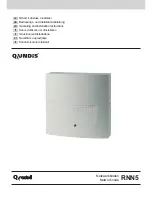
User’s Manual of IGS-20040MT
2. Layer 2 priority value (IEEE 802.1D-2004)
3. Layer 3 Diffserv code point (DSCP) value (IETF RFC 2474)
This network policy is potentially advertised and associated with multiple sets of application types supported on a given port.
The application types specifically addressed are:
1. Voice
2. Guest Voice
3. Softphone Voice
4. Video Conferencing
5. Streaming Video
6. Control / Signaling (conditionally support a separate network policy for the media types above)
A large network may support multiple VoIP policies across the entire organization, and different policies per application type.
LLDP-MED allows multiple policies to be advertised per port, each corresponding to a different application type. Different ports
on the same Network Connectivity Device may advertise different sets of policies, based on the authenticated user identity or
port configuration.
It should be noted that LLDP-MED is not intended to run on links other than between Network Connectivity Devices and
Endpoints, and therefore does not need to advertise the multitude of network policies that frequently run on an aggregated link
interior to the LAN.
Object
Description
Check to delete the policy. It will be deleted during the next save.
Delete
Policy ID
ID for the policy. This is auto generated and shall be used when selecting the
polices that shall be mapped to the specific ports.
Application Type
Intended use of the application types:
Voice
- for use by dedicated IP Telephony handsets and other similar
appliances supporting interactive voice services. These devices are
typically deployed on a separate VLAN for ease of deployment and
enhanced security by isolation from data applications.
Voice Signaling (conditional)
- for use in network topologies that
require a different policy for the voice signaling than for the voice
media. This application type should not be advertised if all the same
network policies apply as those advertised in the Voice application
policy.
Guest Voice
- support a separate 'limited feature-set' voice service for
guest users and visitors with their own IP Telephony handsets and
other similar appliances supporting interactive voice services.
Guest Voice Signaling (conditional)
- for use in network topologies
that require a different policy for the guest voice signaling than for the
310
















































